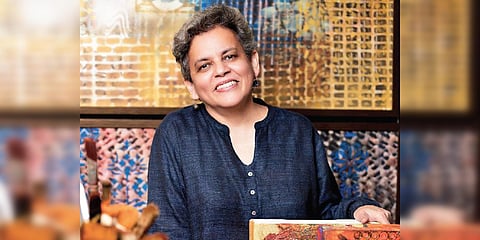

In her characteristic soft tone, wearing a smile that never fades, Brinda Miller, festival director of the Kala Ghoda Arts Festival, holds up a kilim cushion cover. Nimbly rendered in the slit weave technique with signature diagonal and geometric patterns, she hand-picked the product that’s been given a chic makeover.
That's precisely what Miller has been doing before the 22nd edition of the festival went digitally live from February 6-14: Hand-picking handicrafts for 'the marketplace' segment of the festival that’s gone online for the first time.
It was a game of patience for Miller. "The products had to showcase the eclecticism inherent in our local customs. They had to be aesthetically endearing as well as financial viability for the craftsmen," says Miller, also the chairperson of the Kala Ghoda Association.
On till February 28, the 70 e-stalls present wearables such as jewellery and clothes. You also have an assortment of handbags, potlis, pouches, paintings, artefacts and home goods, including planters, cushions, tableware, serveware, cutlery, votives and more.
One among these is Ekibeki that gives employment to women from marginalised communities by training them in drawing and other kinds of artwork.
It also helps artisans commercialise their merchandise by design interventions, assisting them to understand market trends, demand and supply cycles, price trends, and providing opportunities for them to connect with various agencies, in addition to training in the making of ceramic crafts.
With dextrously rendered bead and thread work jewellery and accessories, Studio Vam gives a modern spin to ethnic pieces. "The tribal community of North Sahyadri is represented through Dharatari, an initiative by AYUSH (Adivasi Yuva Seva Sangh), which specialises in decorative bottles and coasters," says Millar.
Having said that, the dismal reality is that many clusters are under severe threat of extinction. They've been disintegrating, with artisans migrating to cities in search of unskilled employment. "We've done our bit by introducing craftsmen to buyers through the virtual marketplace platform but there’s a long way to go to attain total sustainability," she says.